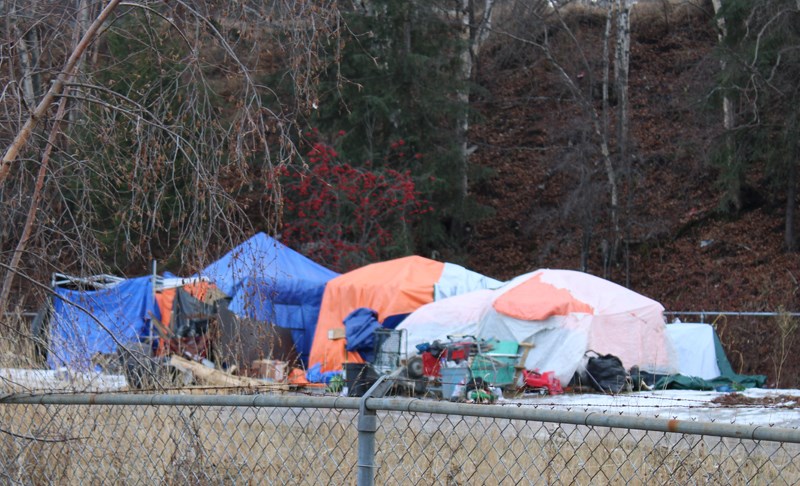The City of Prince George is withdrawing its appeal in a court case which sought to close the encampment on Lower Patricia Boulevard, also known as Moccasin Flats, and is apologizing for “inflicting serious harm on vulnernable people”.
Back on October 25, 2021 in the Prince George vs. Stewart case, Chief Justice Christopher Hinkson ruled against the City’s injunction request to close the encampment, which the city was appealing.
Then on Feb. 23 the city also lost a second time in court, when Justice Simon Coval ruled against the city’s second request to close the encampment in the Prince George vs. Johnny case.
The City says that after reviewing the Court in the Stewart and Johnny cases, and upon reviewing additional external legal advice, the City is re-evaluating its approach and response to homelessness and homeless encampments.
“In the Stewart and Johnny cases, the City proceeded to court based on the reports from service agencies responsible for the provision of housing that sufficient shelter space and housing existed in the City for all those in the Lower Patricia encampment,” states the City in a media release.
On hearing the cases, the Court ruled that not enough housing or shelter space which is accessible to all homeless people, is available in Prince George.
A recent housing needs report, commissioned by the city, also found that the city needs 72 more emergency shelter spaces including 40 emergency shelter units.
City apologizes to 'all those who experienced trauma'
In the judgment of the Prince George v. Johnny case, Justice Coval found that the City of Prince George “inflicted serious harm on vulnerable people,” when the city removed shelter structures from the Lower Patricia encampment on Nov. 17, 2021.
In the affidavits, Moccasin Flats residents stated they lost shelter, clothing, and irreplaceable personal items like the ashes of loved ones due to the destruction of the camp.
“The City of Prince George sincerely apologizes to all those who experienced trauma from our actions. The City dismantled a portion of the Lower Patricia encampment on the belief that those shelters were abandoned,” states the City.
“The City accepts the decision of Justice Coval, and understands what additional steps could have been taken to ensure those shelters had been permanently abandoned, and what additional evidence could have been brought to Court to show this to be the case.”
The City says it regrets any harm caused by its actions and through the processes acted in good faith, with the benefit of legal advice, and in partnership with BC Housing and other service providers.
“The intention of the City has been to advance and protect the interests, health and safety of all the City’s residents – including encampment occupants, downtown business operators, and residents of the nearby Millar Addition subdivision.”
The City says that in the immediate future while housing solutions with health supports are sought for the remaining occupants of the Lower Patricia encampment, the City will work with the Province and BC Housing to find ways in which to mitigate the ongoing impact of the remaining encampment.
This includes working with the residents of the Millar Addition subdivision on measures to address their safety and security concerns.
“The City is deeply conscious of the impacts of homelessness on those who are experiencing it and of the impacts of encampments on the community, including on local residents and business operators.”
The city also notes that while the appeal has been withdrawn there are still pending legal issues with the court proceedings so it will not be providing further comment on legal matters.
'This was about to become a high-profile case'
BC First Nations Justice Council (BCFNJC), who represented the residents of Moccasin Flats, said it acknowledges the public apology and withdrawal of Appeal in the City of Prince George v Stewart.
BCFNJC says after having successfully argued in the Respondents’ favour and the Court refusing to grant an injunction for the dismantling of Moccasin Flats in October 2021, the City of Prince George dismantled portions of the encampment and at the same time appealed the decision.
“We are pleased that the City has withdrawn their Appeal and are no longer pursuing legal action against the vulnerable citizens of Prince George,” said Melanie Begalka, co-legal counsel for the Respondents.
“While we are disappointed that the Court of Appeal will not have the opportunity to weigh in on the legal issues, we are encouraged that the City is going to be taking a different approach, one that hopefully respects the rights, humanity and dignity of people sheltering outside.”
“This was about to become a high-profile case,” added Darlene Kavka, co-legal counsel for the Respondents.
“The Attorney General of BC, BC Civil Liberties Association, Pivot Legal Society and the BC Assembly of First Nations, had all been granted Intervenor status in this case. This would also have been a special sitting of the Court of Appeal held in the City of Prince George.”
BC First Nations Justice Council opened three Indigenous Justice Centers in 2020 in Prince Rupert, Prince George and Merritt to provide free legal service to BC Indigenous people.







